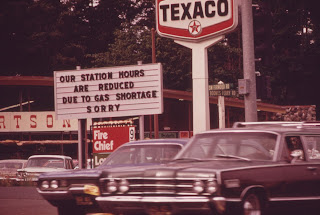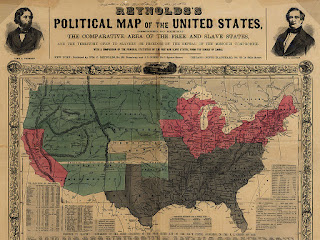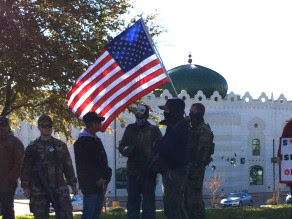So this is a bit more of an opinion piece than a firm historical summary, but I've recently seen an increasing number of social media posts that summarize the current situation in the United States under the heading "The Baby Boomers had the best most amazing economy and society EVER and they destroyed it an orgy of greed and stupidity." This is usually combined with a idealized vision of the post-World War II economy of the United States, with descriptors like "Virtuous Cycle" when describing that economic period of time in the United States.
I would like to posit though that Baby Boomers and Millennials share a more in common than many of them realize and the reaction of the Baby Boomers in shifting to support Ronald Reagan in the early 1980s is not that far off from the election of Donald Trump. Strap in and let us see where this crazy line of thought takes us.
The cornerstone of my theory rests on what I define as the "grit years" - specifically when individuals are between 16 to 28 years of age. From my reading of history that seems to be the period when people have the most energy to protest, challenge the status quo, and extend demands upon their government in the United States. Post those ages people seem to calm down, settle into raising families and building a wealth position, and shift more center in their politics. (Usually center-left or center-right depending on their younger leanings.) General trends though, there are plenty of examples of those who keep their fire up throughout their life.
So based on that Baby Boomers are, most broadly, defined as the generation born between 1943 to 1964. The birth rate exploded between 1948 to 1958 so that ten year clump is peak "Boomer Time".
That would put our first edge of Boomers reaching the "grit age" around 1959 and the last of the reaching that "grit age" around 1980. The biggest clump though got to the "grit age" between 1964 to 1974. If you look at the demographic curve this huge clump of people got into their late teens and early twenties in the 1960s, which makes sense if you think about it, we've all seen the huge number of protests and outrage over the Vietnam War and Civil Rights. Two defining moments when the young citizens of the United States, combined with older supporters from the Greatest Generation (TM), rose up and demanded significant progress from their nation.
That is an image from 1968, the My Lai Massacre, a horrific wartime atrocity committed by the United States where a village of Vietnamese civilians were slaughtered. The story came out in 1969 and resulted in wide-spread outrage, not only that this had happened but that the United States government and military had first attempted to conceal it and then blamed it on combat officers violating their orders. Soldiers pointing out this sort of incident happened often, and was at the implied or verbal orders of their superiors, was ignored. Combine that with the continued horror show domestically around civil rights, and you have a combined effort of the citizens attempting to change the direction of their government and being ignored.
The Vietnam War didn't end for the United States until 1973 and the period from 1969 to 1973, under Richard Nixon, involved a crappy peace deal, a temporary expansion of the war into Laos and Cambodia, and more heavy bombing. Nixon also refused to really engage with those who were outraged at these events and instead pushed hard to follow his own course politically. Which meant if you were a Baby Boomer entering your "grit years" in the early 1970s you got watch all of the efforts at protest and anger seem to do little to nothing to really impact change. Combine that with the Watergate investigation and you can imagine youth confidence in government, and its handling of any aspects of the nation's direction, was badly shattered.
So what about the magical economy that Baby Boomers inherited, the one that now Millennials envy and blame Baby Boomers for destroying? Well the 1970s was dominated by a serious economic crisis, a combination of economic stagnation and inflation termed "stagflation" that impacted the entire globe. There are several factors and, honestly, no one even today quite knows for sure what caused it, but several factors combined to make the 1970s an economically difficult time. Government policy at the time didn't really seem to address the issue either and the economic crisis of the 1970s just dragged on, with inflation and rising interest rates combining to slam people in their twenties and thirties into the economic dirt.
Unemployment rates from 1974 through 1979 were not that far off from unemployment rates between 2008 - 2013. Inflation rates in that period were insanely high compared to the modern era, ranging from 6% at the bottom to over 13% in 1979. GDP growth in that same period was also sluggish as well. For those checking the late teens and early twenties would cover those Baby Boomers born between 1953 to 1959 roughly. Too young to engage in the protests of the 1960s (but old enough to remember them), to have grown up during the final booming years of the 1960s, and coming into their own when the economy tanked and their forebears seemed to have ruined everything before them.
I'd even this group of Baby Boomers and current Millenials get to share a general disbelief at the federal government's seeming inability to come up with a solid plan to address these economic issues. People in their early twenties through their early thirties in the 1970s wanted jobs, a growing economy, security in the face of foreign competition, and an end to economic uncertainty. What they got was the WIN campaign with signs like this (Gerald Ford) and depressing speeches about how everyone would need to cut their energy consumption (Jimmy Carter).
(Give one of Carter's energy reports a listen, it is about five minutes in length and remember, this is Carter trying to cheer the nation up about the energy crisis.)
I encourage any Millenials and Generation X readers to have a chat with your parents/grandparents about the 1970s and what the economy felt like for them. Ask about how it felt politically, you will probably be surprised to see pursued lips and a furrowed brows. People generally don't like to dwell on this period in the 1970s, it was too damn depressing. I imagine many Millenials will have the same reaction when asked about the late 2000s.
So how does this end up? Well...
I would argue with an upscale 1980s version of Donald Trump, specifically Ronald Reagan. Now Reagan has a lot to latch onto to argue he was a better President than Donald Trump, he had actual public office experience for one thing. But there are some eerie similarities:
- Reagan went into office with promises to reform Washington and end its current systems of welfare and social support
- Reagan planned to reduce the scope of government and end its comfortable bureaucratic structures that he claimed were throttling innovation in the United States
- He staffed his cabinet with anti-government officers bent on reducing regulation and redefining how the United States federal government operated
- Reagan had a serious love of tax cuts, although he did roll them back
- Reagan also had a serious love of military spending and expanded it greatly
- He was a foreign affairs maverick whose efforts in dealing with the Soviet Union really shifted the stance of the United States
- He was a "Big Picture, Few Details" kind of President
- Delegate, delegate, delegate
- An administration plagued with regular scandals
So why did Boomers vote for Reagan in such droves, shifting the political coalition of the time and sweeping former Democratic strongholds to support Reagan? The same reasons you'd probably find for the support for Trump among that group - issues about social stability, feelings of insecurity in the future, and the promise of economic reform.
Overall I'd say this for people reading this long opinion piece - I would recommend against accepting the idea that Baby Boomers had a paradise and ruined it. Instead I would offer that Baby Boomers ended up inheriting a United States undergoing a series of interlinked and seemingly intractable problems in the 1970s combined with a government that seemed out-of-touch and unwilling to adjust to the demands of the era. They demanded change, swinging to a Right wing candidate who promised common sense solutions to the problems facing the United States. Millenials and Baby Boomers - stop chopping into each other, to my eye you both have more in common than you might want to admit.
Sources: Wikipedia articles on Ronald Reagan, US economic history in the 1970s, My Lai Massacre, Vietnam War, Baby Boomers, TheBalance on US unemployment rates/inflation/growth,



























